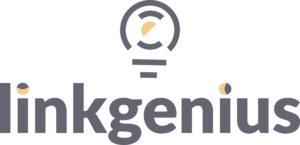How Does Your New Website Survive an Algorithmic Penalty?
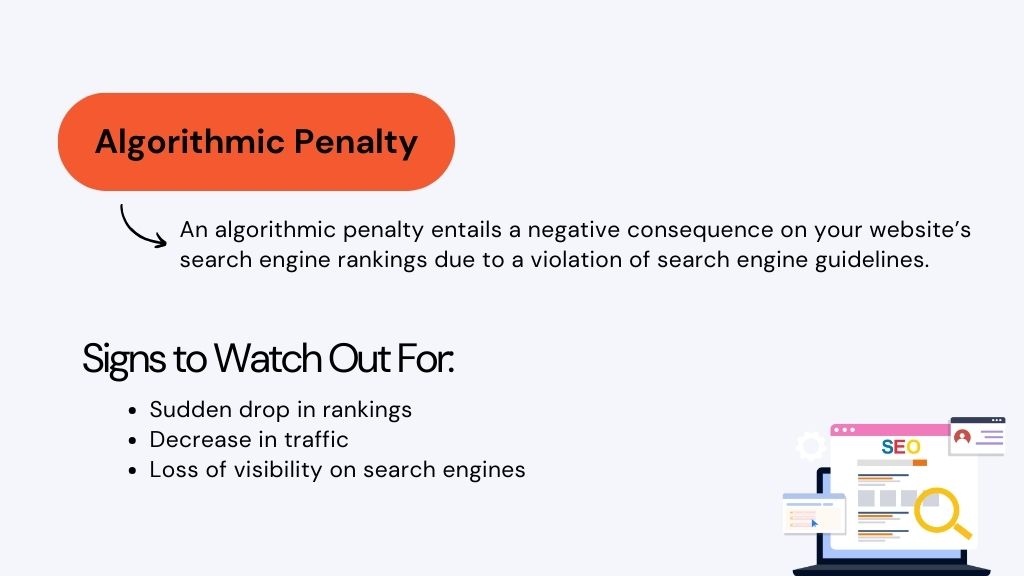
Launching a new website can be an exciting venture, but it also comes with challenges. One of the biggest hurdles is dealing with an algorithmic penalty from search engines like Google. An algorithmic penalty can significantly drop your site’s rankings, reducing traffic and visibility.
Let’s explore expert insights and recommendations on how to survive an algorithmic penalty and recover your website’s performance.
In this article:
- What is an Algorithmic Penalty?
- 5 Common Causes of Algorithmic Penalties
- How to Identify an Algorithmic Penalty
- 6 Steps to Recover from an Algorithmic Penalty
- Preventing Future Penalties
What is an Algorithmic Penalty?
An algorithmic penalty has a negative impact on your website’s search engine rankings due to a violation of search engine guidelines. This is typically caused by updates to the search engine’s algorithm, which aim to improve the quality of search results by penalizing sites that use spammy or manipulative practices.
Signs of an Algorithmic Penalty
- Sudden Drop in Rankings: A noticeable decline in your website’s position in search results.
- Decrease in Traffic: A significant drop in organic traffic.
- Loss of Visibility: Your site no longer appears for certain keywords or is pushed to the back pages of search results.
5 Common Causes of Algorithmic Penalties
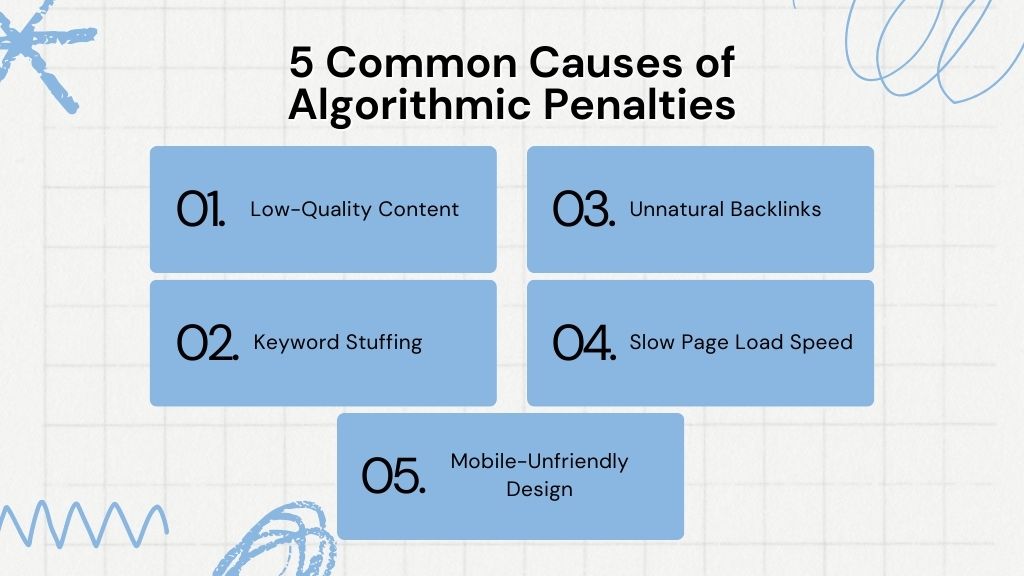
1. Low-Quality Content
Search engines prioritize high-quality, relevant content. If your site has thin, duplicate, or poorly written content, it can be penalized. To avoid this, focus on creating unique, well-researched, and valuable content that answers your audience’s questions. Regularly update your content to keep it current and engaging.
One real estate listing website, Precondo, suffered from the Google Panda 4 update, which focused on-site content quality. Samantha Odo, a division manager for the company, shared that they lost around 30% of their organic traffic overnight. As a result, they saw a revenue drop of around $250,000 per quarter.
“To address this, I led a thorough review of our content strategy,” she said. “ It became clear that our blog posts were overly focused on keyword stuffing rather than providing value to our customers.”
“So, I made the decision to shift our focus towards creating high-quality, informative content that resonated with our target audience. This meant hiring a new team of writers and editors and investing in a content marketing strategy that prioritized quality over quantity.”
It took six months for their website to recover. Fortunately, they saw a 25% increase in organic traffic and a 30% increase in lead generation.
2. Keyword Stuffing
Overusing keywords to manipulate search rankings is known as keyword stuffing. This practice can lead to penalties. Instead, aim for a natural use of keywords that fit seamlessly into your content. Use synonyms and related terms to avoid repetition. Implementing latent semantic indexing (LSI) keywords can help search engines understand the context of your content without keyword stuffing.
3. Unnatural Backlinks
Backlinks from spammy or irrelevant sites can harm your rankings, which can fall under black or grey hat SEO. Search engines look for natural, high-quality backlinks. To build a strong backlink profile, focus on earning links from reputable sites within your industry. Guest blogging, partnerships, and creating shareable content are effective strategies.
4. Slow Page Load Speed
A slow website can negatively affect user experience, leading to lower rankings. To improve page load speed, optimize your images, enable browser caching, and use a content delivery network (CDN). Minimize the use of heavy scripts and plugins, and ensure your server is capable of handling your site’s direct traffic.
Tools like Google PageSpeed Insights can provide specific recommendations for improving load times. Regularly monitoring your site’s performance and making necessary adjustments can maintain optimal speed. Additionally, compressing files and using efficient coding practices can further enhance your site’s load speed.
5. Mobile-Unfriendly Design
With the increasing use of mobile devices, having a mobile-friendly site is crucial. A website that isn’t optimized for mobile can be penalized. Use Google’s Mobile-Friendly Test tool to check your site’s mobile compatibility. Simplifying navigation and improving load times for mobile users can significantly enhance the user experience.
How to Identify an Algorithmic Penalty
Use Google Search Console
Google Search Console is a free tool that provides insights into your site’s performance. Check for any manual actions or penalties listed.
Monitor Traffic with Analytics
Use tools like Google Analytics to track your traffic. Look for any sudden drops that may indicate a penalty.
Compare with Algorithm Updates
Keep track of major algorithm updates from Google. If your traffic drops around the time of an update, your site may have been affected.
6 Steps to Recover from an Algorithmic Penalty
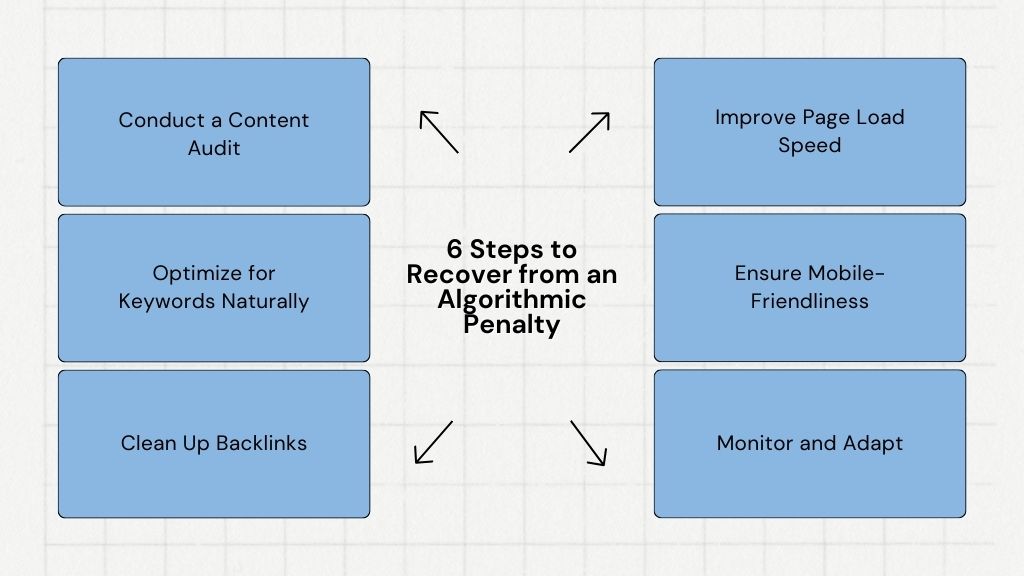
1. Conduct a Content Audit
Review all the content on your website to ensure it meets quality standards:
- Identify Low-Quality Content: Look for thin, duplicate, or poorly written content.
- Improve or Remove: Update low-quality content with valuable information or remove it entirely.
- Add Value: Ensure your content provides value to users by answering their questions or solving their problems.
2. Optimize for Keywords Naturally
Ensure your keywords are used naturally within your content:
- Avoid Keyword Stuffing: Use keywords where they fit naturally within the context.
- Use Synonyms and Related Terms: This can help improve relevance without overloading your content with the same keywords.
- Focus on User Intent: Write content that answers the user’s query comprehensively.
3. Clean Up Backlinks
Remove or disavow low-quality backlinks to improve your site’s link profile:
- Identify Unnatural Links: Use tools like Ahrefs or SEMrush to find spammy or irrelevant backlinks.
- Contact Webmasters: Request the removal of these links from the respective webmasters.
- Disavow Links: Use Google’s Disavow Tool to disassociate your site from harmful backlinks.
4. Improve Page Load Speed
Enhancing your website’s load speed can improve user experience and rankings:
- Optimize Images: Compress images to reduce their size without compromising quality.
- Use Caching: Implement browser caching to speed up load times for returning visitors.
- Minimize Code: Remove unnecessary code and minify CSS, JavaScript, and HTML files.
- Use a Content Delivery Network (CDN): Distribute your content across multiple servers to reduce load times.
5. Ensure Mobile-Friendliness
Make sure your website is fully optimized for mobile devices:
- Responsive Design: Use a responsive design that adjusts to different screen sizes.
- Mobile Testing: Test your site on various mobile devices to ensure compatibility.
- Improve Navigation: Simplify navigation to make it easy for mobile users to find information.
6. Monitor and Adapt
Continuously monitor your site’s performance and adapt to any changes in algorithms or user behavior:
- Regular Audits: Conduct regular audits of your content, backlinks, and site performance.
- Stay Updated: Keep up with the latest SEO news and algorithm updates.
- User Feedback: Pay attention to user feedback and make necessary adjustments to improve their experience.
Preventing Future Penalties
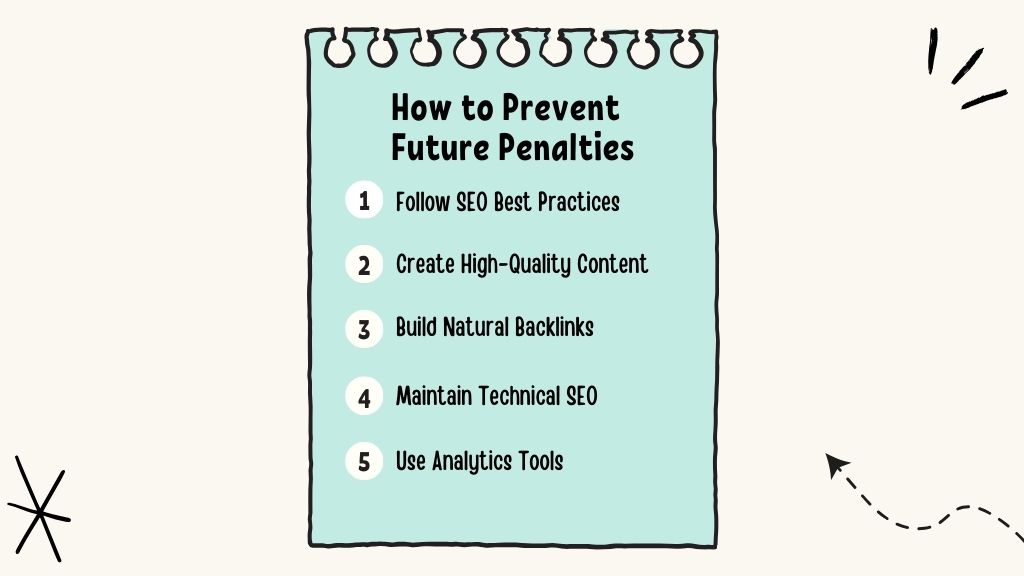
1. Follow SEO Best Practices
Adhere to search engine guidelines and SEO best practices to avoid penalties. This includes ensuring your site is easily crawlable by search engines, using proper header tags, and maintaining a clean and user-friendly site structure.
2. Create High-Quality Content
Focus on producing valuable, relevant, and well-written content that meets user needs. Conduct thorough keyword research to understand what your audience is searching for and tailor your content to address those queries.
3. Build Natural Backlinks
Earn backlinks from reputable sites through high-quality content and genuine outreach efforts. Networking with industry influencers and participating in relevant online communities can help you build relationships that lead to natural backlinks.
Writing guest posts for well-respected blogs in your industry can also earn you valuable links. Additionally, creating link-worthy content, such as comprehensive guides, original research, and interactive tools, can attract organic links.
4. Maintain Technical SEO
Ensure your website’s technical aspects, like load speed, mobile-friendliness, and secure connections (HTTPS), are optimized. Regularly audit your site for technical issues using tools like Screaming Frog or SEMrush. Fixing broken links, optimizing images, and ensuring proper use of header tags are essential steps in maintaining technical SEO.
5. Use Analytics Tools
Regularly use tools like Google Analytics and Search Console to monitor your site’s performance and identify any issues early. Set up custom alerts in Google Analytics to notify you of significant changes in traffic patterns, which can help you quickly address potential problems.
Analyzing user behavior data, such as bounce rates and session duration, can provide insights into areas where your site’s user experience can be improved. Meanwhile, Search Console will monitor your site’s search performance, identify indexing issues, and track the effectiveness of your keyword strategy.
Riding the Algorithmic Tides
Surviving an algorithmic penalty can be challenging, but with the right approach, it’s possible to recover and even improve your site’s performance. By conducting thorough audits, optimizing your content and technical aspects, and adhering to SEO best practices, you can navigate and overcome the setbacks of an algorithmic penalty. Stay proactive, keep learning, and adapt to changes in the SEO landscape to ensure long-term success for your website.
Stay worry-free with your outreach campaigns with Link Genius. Our software helps you secure valuable backlink opportunities to enhance your site’s authority and visibility.
Join the waitlist today and elevate your SEO strategy with Link Genius!
